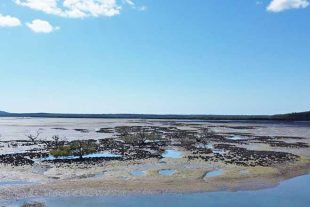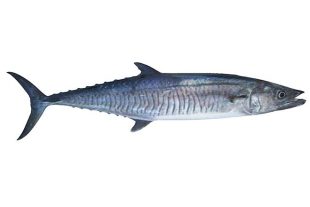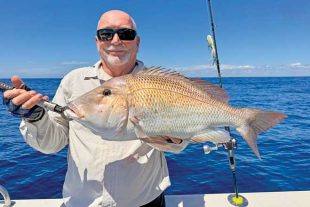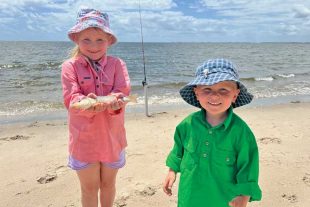The Amateur Fishermen’s Association of the Northern Territory, the peak body representing the recreational fishing sector in the Northern Territory, is calling for urgent weight-based barramundi catch quotas to be introduced for key Top End catchments, including the Daly River and Roper River.
This follows concerns that commercial fishers were targeting bigger harvests from important recreational and Traditional fishing areas, after access changes were announced last year.
Barramundi are big business in the NT, supporting thousands of jobs and forming the backbone of a $270 million recreational fishing and fishing tourism industry.
With over 60,000 – or one-in-three – adult Territorians going fishing each year, the social, health and wellbeing benefits are widespread and well understood.
Together these factors should mean that optimal fishery management is a given, yet nearly a week into the 2024 commercial barramundi fishing season, calls for government action to urgently protect some of the Territory’s most valuable and iconic fisheries remain unanswered.
Traditional Owners closed significant areas of intertidal waters to barramundi netting in 2023.

Recently, the Northern Land Council explained to the ABC that “TOs have deep increasing concerns about the impacts of current commercial fishing practices, particularly gillnetting, and the impact on barramundi fish stocks that they are seeing in their communities.”
Up to 50 percent of the commercial barramundi catch is understood to have been displaced by recent intertidal closures.
Yet, while the fishing area has shrunk, the number of commercial fishing licenses and kilometres of gillnet remain the same, leading to genuine concerns of increased harvest from the remaining open catchments.
AFANT has been engaged with the Northern Territory Government seeking the introduction of conservative interim catch quotas to ensure that 2024 commercial catches do not exceed recent average harvest levels in any catchment.
To date, there has been no announcement from the NT Government.
How can you help?

After reading the above, you may be wondering what you can do to help.
AFANT chief executive officer David Ciaravolo asks that you like, comment (tag your friends) and share AFANT posts to help raise awareness of your concerns.
A week into the 2024 NT commercial barramundi season and there is yet to be an announcement in response to our requests for conservative catchment-based quotas to protect key areas for recreational, tourism and Traditional fishing from increased commercial fishing effort and harvest.
You may have seen a video on Instagram or Facebook outlining our concerns.
If not, we invite you to check it out.

If you are one of the many people or businesses who have shared this post, I want to say thank you for helping to spread awareness, it was shared 115 times for over 11,000 views.
We have received a lot of feedback and support, which I also thank you for.
We have spoken to the NT Country Hour and ABC Radio Darwin Breakfast to outline our concerns.
You can listen to those interviews at abc.net.au/listen/programs/nt-country-hour/nt-country-hour/103397812 and facebook.com/AmatuerFishermenNT/videos/1046369436595804, or scroll down for more information.
This has not merely been a media campaign.
Our recent public commentary follows numerous meetings and correspondence behind the scenes with NT Fisheries, the Minister for Fisheries and the Minster for Recreational Fishing and their offices.
Since October last year, AFANT along with the NT Guided Fishing Industry Association have been working together to urge the NT Government to implement interim controls to limit the take of commercially netted barramundi through catch caps/quota in places such as the Daly and Roper catchments.

While we have had a constructive dialogue and I am confident that we have been heard, we remain disappointed at the lack of concrete action.
We do not think that what we are seeking is radical at all.
We think it is entirely reasonable and conventional that additional controls are required in response to commercial netters not being able to access the intertidal waters where up to 50 percent of their catch came from only a couple of years ago.
There are simply now too many licences and too much net for too few fishing areas.
Additional controls are needed to keep the balance while the fishery reform continues.

We point to the fact that when there have been areas closed to netting by government in the past, there has always been a rationalisation/reduction of licences and the kilometres of net available to the fleet.
In the absence of such structural reform or buyouts, quota – a limit on the weight of fish that can be harvested – could constrain catch to recent averages and prevent an increase in harvest from being allowable while longer term management is developed.
Why the benefits from and values of recreational fishing and the fishing tourism industry in the NT have not yet been assured through an announcement of appropriately strong interim regulations remains something of a mystery.
We have, however, been informed that the commercial sector has been resistant to the proposals we have put to government.
From our conversations with ministers and their staff, we are hopeful that our persistent advocacy and informed professional advice will ultimately see action taken in this space.
If that actually happens and whether that action is strong enough still remains to be seen.
David Ciaravolo
AFANT CEO

 Bush ‘n Beach Fishing Magazine Location reports & tips for fishing, boating, camping, kayaking, 4WDing in Queensland and Northern NSW
Bush ‘n Beach Fishing Magazine Location reports & tips for fishing, boating, camping, kayaking, 4WDing in Queensland and Northern NSW









